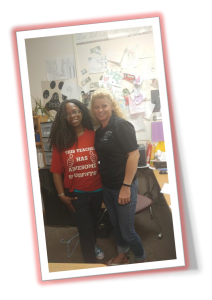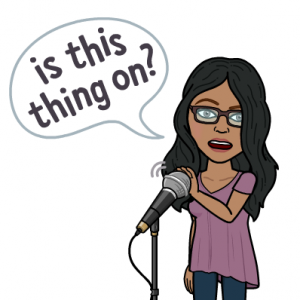“Within every school, there is a sleeping giant of teacher leadership that can be a strong catalyst for making changes to improve student learning. By using the energy of teacher leaders as agents of school change, public education will stand a better chance of ensuring that every child has a high quality teacher…” This is an excerpt from the best-selling book entitled Awakening the Sleeping Giant: Helping Teachers Develop as Leaders by Katzenmeyer and Moller (2009). As we begin to prepare for summer break, one can’t help but wonder how many of our beginning teachers (our future “giants”) will not be returning next year. We know from the 2007 longitudinal study, “Public School Teacher Attrition and Mobility in the First Five Years,” that 10 percent of new teachers in 2007-08 didn’t return the following year, increasing cumulatively to 12 percent in year three, 15 percent in year four and 17 percent in the fifth year. Katzenmeyer’s and Moller’s book draws on their two decades of experience in studying and observing the work of teacher leaders. They express the importance of improving outcomes in schools, and nurturing beginning teachers into teacher leaders from preservice preparation programs through their transformation into veteran teachers. The authors also highlight the importance of ongoing support for veteran teacher leaders. What I truly love about this book is how Katzenmeyer and Moller address three factors critical to teachers stepping into a leadership role: sustaining teacher leadership relationships between adults in the school, organizational structures, and the actions of the principal. The authors also discuss the challenges that many teacher leaders face, including-
- Deciding to accept a leadership role
- Building principal–teacher leader relationships
- Working with peers
- Facilitating professional learning for themselves and others
The good news is that the latest research on teacher attrition found that a much smaller percentage of beginning teachers leave the field in their first five years on the job than the widely quoted statistics of 50 percent, but Awakening the Sleeping Giant demonstrates that this new trend will not be sustained if we don’t invest in our teachers and in their learning. As a mentor teacher, I have personally witnessed the impact of a robust mentoring program on beginning teachers. We can support and improve the effectiveness of beginning teachers through intensive induction support aligned to each teacher’s individual needs. We must also offer realistic opportunities for teachers to take on leadership roles; this helps to retain both beginning teachers and accomplished teachers, which ultimately impacts student learning. Unfortunately, as some of us have experienced, current pathways to leadership typically require teachers to leave the classroom, disconnecting them from the students they love to serve. This inevitably results in some of our most experienced, knowledgeable professionals facing a dilemma: either continue working with students in their classroom where their school-wide influence is limited or take on a leadership position that allows them to shape policy decisions, share their expertise, and introduce innovations. I was faced with this decision before becoming a mentor teacher. However, teachers do not need to choose between students and leadership roles. If school districts are able to create hybrid or split roles, teachers can both teach and carry out leadership responsibilities within their workday, such as being mentors, conducting classroom observations, demonstrating lessons, collaboratively planning, and facilitating professional development most relevant to the school’s needs.
I am grateful that my district allowed me to become one of those hybrid teachers. Think about how many more “sleeping giants” we can awaken by giving them this type of option and opportunity. With this in mind, we have to embed time within the school day for teacher leadership; this will ensure more equitable access to leadership positions as they are no longer reserved for those who can commit to time outside of the contracted workday. Let’s also not forget how having NBCTs in classrooms ensure better outcomes for schools; it’s in our students’ best interest to continue to encourage both beginning and veteran teachers to seek this certification. We should be supporting teachers to allow them space and opportunity to innovate and do great things. This, however, requires a cultural shift in the way schools operate at a systemic level. One of the most basic ways to support teachers is through mentoring and through more flexible working conditions; this would create time for teacher innovation and reflection. Our “sleeping giants” will continue to either remain dormant or just leave the profession altogether if we don’t create a culture where teachers can collaborate, learn from each other, and grow as professionals. Just like we create caring relationships with our students, all teachers need to be nurtured and supported.
 I recently sat down with one of my very own sleeping giants. I was her mentor teacher 3 years ago. This mentorship turned into a beautiful friendship and an unbreakable bond. Talli is going on her 4th year as a classroom teacher. I wanted to know how she defied all the odds (are we doing enough to awaken this beginning teacher?). I also wanted to know what keeps her teaching and what advice she would give to other beginning teachers.
I recently sat down with one of my very own sleeping giants. I was her mentor teacher 3 years ago. This mentorship turned into a beautiful friendship and an unbreakable bond. Talli is going on her 4th year as a classroom teacher. I wanted to know how she defied all the odds (are we doing enough to awaken this beginning teacher?). I also wanted to know what keeps her teaching and what advice she would give to other beginning teachers.
Meet Talli…in her own words—
Talli, why did you become a teacher?
At a young age, I knew that I wanted to do something that would give me an important purpose in life, something that would make me feel like I mattered and made a difference. Teaching was it! It has been an amazing adventure ever since.
Was there ever a time when you ever felt like “throwing in the towel?” If yes, please share the circumstances surrounding the decision and what made you decide to stay.
My first year of teaching was a major challenge almost every day. I cried. I stressed. I couldn’t figure out if it was because of something I was doing wrong that was keeping me from reaching them, or if it was because they were a rough group of kids and there was little hope for them. It took me months of trial and error before I realized that it was my lack of consistency as an educator for my failure. I learned that every child can learn but it was up to me to figure out how to teach them. In the end, I probably learned more than they did. I stayed because people like you and others told me it would get better and how we all have had these same experiences.
What’s been your biggest challenge in this profession? Do you feel like your pre-service training adequately prepared you for life in the classroom?
The biggest challenge is probably making sure that I am reaching every child, every day and having the necessary tools to do so. While that may seem like an impossible goal to reach, it is my goal, nonetheless. Being a substitute teacher for so many years really did help me gain the skills that aren’t taught in college. Some things that are needed to be an effective, successful teacher can’t be learned from books. They are learned by stepping into the classroom and going for it.
You are a beginning teacher who took part in mentoring and now you are approaching your 4th year. Research says that this is the time when many beginning teachers begin to make some tough choices about remaining in the profession. Why have you stayed?
Yes, I am going into my 4th year as a teacher and being a part of the mentoring program was a life-saver! I was able to share my frustrations and realize that they were other teacher’s frustrations, too. You saved me almost every day of the week! You and the other mentors help me navigate. I listened to your wisdom and soaked up every word. You are a big part of my professional AND my personal life.
Is there anything principals, school districts or even veteran teachers should be doing or can do to help beginning teachers stay in the profession? In other words, what more should be done to help first year teachers stay in our profession? As a profession, what should we be doing? Are we doing enough?
Constant communication and constant support really is key. Without that, along with my love of public education, I would not have survived my first year. There are always things that can be done better. I have been very lucky to have such supportive friends and highly knowledgeable administration on this campus. It really helps that our campus administration were all teachers so they have ‘been there, done that’. Don’t even get me started on our state, however!!!!
Do you feel like you are making an impact in this profession and your voice is being heard?
I have had my moments of doubting the importance of my opinion in this district. However, it is key to communicate those doubts to the right people rather than just the teacher next door. While being able to express and share with friends, discussing your opinion with the right people that can really help with any issues is what matters. We all have an important voice. It just needs to be heard by the right people.
What advice would you give beginning teachers just coming into the profession?
If I could give any advice to a new teacher, it would be to be consistent with your expectations and develop a trusting relationship with each and every one of your students. Let them learn who you are and learn to see them for their differences as well as their similarities. Laugh with your students. Learn with your students. Admit fault when you need to. Humor and Humility are very important character traits to have when teaching middle school students.
As we pack up for the summer, and reflect on the current school year, think about the impact you may have made on the life of a new teacher. Talli’s responses show the importance of building positive, nurturing relationships with our beginning teachers; we have to reach out to them and show them we care. You may be the very reason why a teacher decides to return next year. We also have to awaken the “sleeping giant” in all of us. Many of us had quite a challenging school year; some of you may be contemplating if you should return to the classroom next year. However, as you reflect on your journey as a teacher, I would like you to think about this short but very powerful quote—
“I am not a teacher, but an awakener.”-Robert Frost
Teachers are important to every community on our planet. We contribute to each aspect of society and our influence touches all lives! Never forget how much you are needed and appreciated. ![]()
YOU MATTER!! HAVE A WONDERFUL SUMMER BREAK!!!












Comments 3
Great post, Treva. It was especially nice to hear the voice of a 4th year teacher about what had retained her in the profession so far. It’s great you were able to find a hybrid role that utilizes your leadership skills and your expertise as an teacher of children. I think that we (mistakenly) coach many teachers out of the classroom to “make a bigger difference” and then they are unhappy in their roles for various reasons, often including the limited time they get to spend with kids. I think we should coach great teachers to STAY in their positions and LEAD FROM WITHIN or seek hybrid positions that offer time with students as well as leadership responsibilities. Sadly, I think many teachers accept leadership roles to increase their pay. I was talking with someone today who clearly loves teaching, but told me she is going back to school to become a school psychologist. She specifically cited the reason as being money. I think it’s awesome when everyone finds their niche that contributes to the education of young kids, and I think it’s sad when those decisions are related to money or leadership limitations. I’m dreaming of a future when teachers can choose their roles based on talents and enjoyment of their jobs instead.
Treva, the irony of this post is that you write it from so many roles: as a teacher, colleague, mentor, confidant, and learner. This is the type of work more of us should engage in.
I love what Talli says about communicating one’s opinions to the right person… that is such a wise insight for so young a teacher. She must have had a good mentor!
Having shifted jobs several times over the past 8-10 years, I have learned to try to stay out of the gossip / whining cycle. It can be difficult, because often it can become the way we connect with other teachers around us: shared woes, and when you are new to a community, you are always looking for ways to get to know people and connect. Developing relationships with those who actually have the power to make change can feel more intimidating than chatting with colleagues (even after all these years I still get awkward about it!!), and yet it is so important!
Great post!